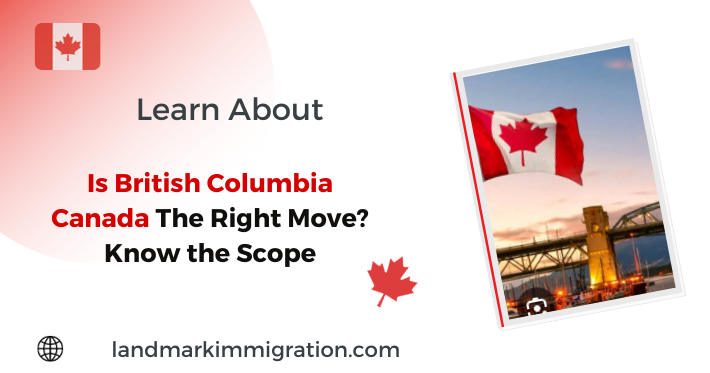
21 December 2023
Deciding to relocate to a different province is a major life decision. British Columbia, renowned for its stunning landscapes, diverse communities, and flourishing economy, appeals to those in search of an energetic lifestyle and abundant prospects. However, determining if British Columbia (BC) is the right fit requires a comprehensive understanding of various aspects. Here’s a detailed guide to assist you in evaluating whether moving to British Columbia aligns with your aspirations and lifestyle preferences.
Why is British Columbia attracting more Immigrants?
Understanding British Columbia:
Diverse Regions:
- BC offers diverse landscapes, from coastal regions to mountainous terrains, each with its unique appeal.
- Explore regions like Vancouver, Victoria, Okanagan, and Vancouver Island, each offering distinct lifestyles and opportunities.
Economic Opportunities:
Thriving Economy:
- BC boasts a strong economy with sectors like technology, tourism, forestry, and natural resources.
- Research job prospects, industries, and economic stability in your field of interest.
Cost of Living:
Affordability Considerations:
- Evaluate the cost of living, including housing, transportation, healthcare, and everyday expenses.
- Compare living costs in different cities or regions within BC to align with your budget.
Climate and Environment:
Varied Climate:
- BC experiences a diverse climate, from mild coastal weather to snowy winters in some regions.
- Consider your preferences for climate and surroundings when choosing a location within BC.
Cultural and Social Scene:
Multicultural Society:
- Embrace a culturally diverse community with a blend of ethnicities and vibrant cultural events.
- Assess social opportunities, community engagement, and lifestyle compatibility.
Education and Healthcare:
Education Standards:
- Explore the quality of education, schools, colleges, and universities in BC, especially if you have children.
- Evaluate healthcare facilities, accessibility, and services available in different regions.
Transportation and Infrastructure:
Connectivity and Commute:
- BC offers well-connected transportation networks, including public transit and roadways.
- Assess the commute, accessibility, and infrastructure in areas you are considering moving to.
Outdoor Activities and Recreation:
Natural Splendor:
- BC is renowned for its outdoor activities, including hiking, skiing, water sports, and wildlife.
- Consider your interests in outdoor recreation and the availability of such activities.
How to Make the Right Choice?
Moving to British Columbia involves careful consideration of various factors impacting your lifestyle, career, and overall well-being. By evaluating these aspects and aligning them with your aspirations and preferences, you can determine if British Columbia is the right destination for your next chapter in life.
Work-Life Balance:
Lifestyle Preferences:
- Consider BC’s laid-back lifestyle, emphasis on work-life balance, and proximity to nature.
- Assess if this aligns with your personal values and lifestyle choices.
Legal and Immigration Considerations:
Legal Requirements:
- Understand immigration regulations, legal aspects, and procedures if you are moving from outside Canada.
- Ensure you meet visa or residency requirements before planning the move.
Making an Informed Decision:
Research and Consultation:
- Collect detailed information, visit BC if feasible, and consult with residents or individuals who have moved there.
- Evaluate the advantages and disadvantages, prioritize your preferences, and make a well-informed choice regarding your relocation.
Housing Prices
Housing prices in British Columbia have steadily risen in recent years. In Metro Vancouver, between 2010 and 2021, the average rental price surged by 52.8%. Units with three bedrooms or more saw the most significant increase, jumping by 65.0%.
Notably, cities like Vancouver and Victoria are notorious for their high living expenses and housing costs. For instance, the average home price in British Columbia stands at $932,979, while a typical 2-bedroom rental goes for about $3,750.
For those seeking rental options, there are various choices available, including basement apartments, shared accommodations, and studios. However, it’s essential to note that the prices for these types of living spaces might also be influenced by the overall housing market trends.
Before relocating to British Columbia, it’s crucial to explore the varying costs of living and housing across different cities. While cities like Vancouver and Victoria are recognized for their expensive lifestyles, more budget-friendly choices exist in places like Saanich, Fort St. John, and Kelowna.
Expensive Cities
Vancouver holds a reputation as one of Canada’s and the world’s priciest cities. Its average cost of living stands at $2,344, ranking 272nd among 9,294 global cities and 5th among 153 cities in Canada. Moreover, the median after-tax salary of $3,423 generally covers living expenses for about 1.5 months.
Similarly, Victoria, the provincial capital, grapples with a high cost of living despite being smaller than Vancouver. It contends with costly housing and a competitive rental market, mirroring some of Vancouver’s challenges.
Inexpensive Cities
While certain cities pose high housing and living expenses, there are more budget-friendly options to reside within British Columbia. Saanich, Fort St. John, and Kelowna stand out as examples of relatively more affordable cities.
Conclusion
Your dream to live in British Columbia is a few considerations away. Our experts at Landmark Immigration will make things work your way to turn your dream into reality.




